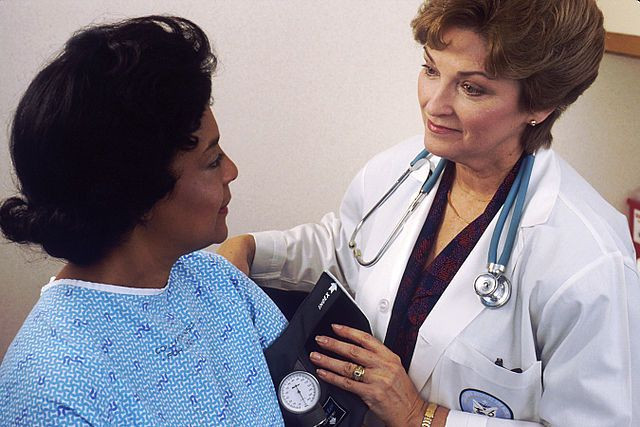Weight Gain, Hot Flashes, Depression: The Tight Rope Walk When Treating Menopause

A medication newly approved by the U.S. Food and Drug Administration (FDA) has been making headlines before it has even become available.
BRISDELLE, which is intended to treat hot flashes in menopausal women, is stirring controversy because it contains 7.5 milligrams of paroxetine, a medicine also used to treat psychiatric disorders. The dose is lower than the amount found in medications, such as Paxil and Pexeva, which treat major depressive disorder, obsessive-compulsive disorder, panic disorder, and generalized anxiety disorder.
Prior to this, hormone therapy was the only FDA-approved treatment for hot flashes. Hormone therapy involved taking medications containing female hormones to replace the ones the body no longer makes after menopause; moreover, it was believed to promote long-term benefits such as preventing heart disease and possibly dementia. For some years, hormone replacement therapy, as it was originally called, used to be a standard treatment for women with hot flashes and other symptoms.
Then the tide turned when a large clinical trial found that hormone therapy posed more health risks than benefits.
Risks in Treating Menopause
Particularly when given to older postmenopausal women, a combination estrogen-progestin pill (Prempro) increased the risk of certain serious conditions, including heart disease, stroke, blood clots, and breast cancer. A related clinical trial evaluating estrogen alone (Premarin) in women who previously had a hysterectomy found no increased risk of breast cancer or heart disease but similar risk of stroke and blood clots when compared to the combination therapy. As the concern about health hazards attributed to hormone therapy grew, doctors became less likely to prescribe it and women less likely to ask for it.
Although hot flashes, otherwise known as vasomotor symptoms (VMS), and a depressed mood during the years of perimenopause have been noted by scientists, BRISDELLE, by its very nature, seems to bring the relationship between the two into greater focus. Is linking depression and menopause, as Brisdelle does, valid?
Symptoms of Menopause
Hot flashes are the predominant symptom associated with menopause and many studies confirm their high prevalence. For instance, vasomotor symptoms were reported by nearly 60 percent of women in the Study of Women's Health across the Nation (SWAN). Although scientists link hot flashes to changes in reproductive hormones, the etiology remains poorly understood. A leading hypothesis is that hot flashes are triggered by changes in estrogen, which is known to influence thermoregulatory functioning.
Other menopausal symptoms, such as depressed mood and poor sleep, are also common. One study identifying depressed mood in the menopausal transition was the community-based Harvard Study of Moods and Cycles, where a two-fold increase in depressive symptoms was observed among perimenopausal women who had no previous depression. The relationship between these symptoms and changes in hormones is poorly understood. Some believe that depressed mood in perimenopausal women is an end result of hot flashes or night sweats that lead to poor sleep, which in turn leads to depression; yet, data to demonstrate these associations are lacking.
In another 10-year study conducted by researchers from the University of Pennsylvania School of Medicine, women who had no experience of hot flashes or depressed mood at baseline showed significant vulnerability to both during menopause. About one-quarter (24 percent) of the women reported neither hot flashes nor depressed mood in the 10-year interval. Sixty-seven percent of the women reported hot flashes, 50 percent reported depressed mood, and 41 percent reported both symptoms during the study interval. Reporting both hot flashes and depressed mood was greater than expected if the processes operated independently. Of the women who experienced both symptoms, depressed mood was more likely to precede hot flashes.
Noven Pharmaceuticals, Inc., the manufacturer of the new menopausal drug, stresses that the "lower dose of paroxetine in BRISDELLE has not been studied in any psychiatric conditions and BRISDELLE is not approved for any psychiatric uses." Yet, with evidence that depression is linked to both menopause and hot flashes, it seems logical that the scientists involved in BRISDELLE's creation considered the possibility that it just might help with both symptoms. With about 37.5 million women reaching or currently at menopause (ages 40 to 59), according to the CDC, that's a lot of people who might be in the market for a treatment.
Do women accept their menopausal symptoms as both temporary and natural, or will they rush to treat them? That probably depends on the efficacy of the medication as well as its side effects.
To Treat Or Not
Another extremely common symptom of menopause is weight gain. Although how much weight a woman gains after menopause varies, a 2010 study published in the International Journal of Obesity found that women gain an average of 12 lbs. within eight years after menopause. Even among those women who maintain the same weight, many notice their waistline expanding.
Although scientists have long understood a link between menopause and weight gain, a new study, co-authored by the Mayo Clinic, has spelled out the exact relationship: Proteins, excited by the estrogen drop, cause fat cells to store fat more efficiently; and these cellular changes slow down the body's fat burning. In the dose found in Paxil, paroxetine is reputed to cause weight gain. For menopausal women, who face increasing risks of cardiovascular events and diabetes, a medication that causes weight gain will be something they might wish to avoid.
Only time will tell the benefits of BRISDELLE and how menopausal women respond to it. Noven says its new drug will become available in U.S. pharmacies in November 2013.
Sources: Freeman EW, Sammel MD, Lin H. Temporal Associations of hot flashes and depression in the transition to menopause. Menopause. 2009.
Freeman EW, Sammel MD, Lin H, Nelson DB. Associations of hormones and menopausal status with depressed mood in women with no history of depression. Archives of General Psychiatry. 2006.
Published by Medicaldaily.com



























